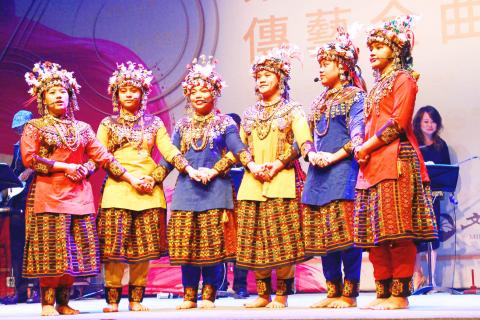A country’s level of democracy is reflected in the development of its performing arts, Deputy Minister of Culture Hsiao Tsung-huang (蕭宗煌) said yesterday, ahead of the 30th Golden Melody Awards for Traditional Arts and Music in Taipei on Aug. 10.
The arts are the most important aspect of a nation’s soft power and traditional arts are the essence of its culture, Hsiao said.
“In Taiwan, we have cultural heritage from China, Japan, the Netherlands, Spain and Portugal, which has produced a melting pot of cultures and acceptance of them,” Hsiao said. “Against that background, we can see great diversity in traditional arts in Taiwan.”

Photo: CNA
The development of a country’s performing arts reflects its level of democracy, he said.
The awards honor artists, groups and works that have contributed to Taiwan’s diverse, creative and rich cultural heritage, organizers said.
“Artists, promoters and people who work in the traditional and cultural performing arts” will be among the winners, National Center for Traditional Arts director Chen Chi-ming (陳濟民) said.
The Taipei Philharmonic Chamber Choir’s album Image Taiwan II has been nominated for six awards — best cover art, best performance, best recording, best composition, best lyrics and best producer.
The theater production The Cursed Royal Family by the Tang Mei-yun Taiwanese Opera Company has been nominated for best ensemble performance, best script, best actor and best music design.
Singing Organ in the Rainy Night by Gwhyenth Chen (陳毓襄) has been nominated for best art music album, best album producer, best recording, best musical performance and best arrangement.
Sound engineer Yeh Chwei-ching (葉垂青) and playwright Wang An-chi (王安祈) will receive special awards for their “contributions and achievements in the fields of traditional and artistic audio publishing, and theatrical performing arts respectively,” the Ministry of Culture said.
In 2014, the event was separated from the Golden Melody Awards and have since been run by the National Center for Traditional Arts.

Taiwan is stepping up plans to create self-sufficient supply chains for combat drones and increase foreign orders from the US to counter China’s numerical superiority, a defense official said on Saturday. Commenting on condition of anonymity, the official said the nation’s armed forces are in agreement with US Admiral Samuel Paparo’s assessment that Taiwan’s military must be prepared to turn the nation’s waters into a “hellscape” for the Chinese People’s Liberation Army (PLA). Paparo, the commander of the US Indo-Pacific Command, reiterated the concept during a Congressional hearing in Washington on Wednesday. He first coined the term in a security conference last

Prosecutors today declined to say who was questioned regarding alleged forgery on petitions to recall Democratic Progressive Party (DPP) legislators, after Chinese-language media earlier reported that members of the Chinese Nationalist Party (KMT) Youth League were brought in for questioning. The Ministry of Justice Investigation Bureau confirmed that two people had been questioned, but did not disclose any further information about the ongoing investigation. KMT Youth League members Lee Hsiao-liang (李孝亮) and Liu Szu-yin (劉思吟) — who are leading the effort to recall DPP caucus chief executive Rosalia Wu (吳思瑤) and Legislator Wu Pei-yi (吳沛憶) — both posted on Facebook saying: “I

The Ministry of Economic Affairs has fined Taobao NT$1.2 million (US$36,912) for advertisements that exceed its approved business scope, requiring the Chinese e-commerce platform to make corrections in the first half of this year or its license may be revoked. Lawmakers have called for stricter enforcement of Chinese e-commerce platforms and measures to prevent China from laundering its goods through Taiwan in response to US President Donald Trump’s heavy tariffs on China. The Legislative Yuan’s Finance Committee met today to discuss policies to prevent China from dumping goods in Taiwan, inviting government agencies to report. Democratic Progressive Party Legislator Kuo Kuo-wen (郭國文) said

Sung Chien-liang (宋建樑), who led efforts to recall Democratic Progressive Party (DPP) Legislator Lee Kun-cheng (李坤城), was released on bail of NT$80,000 today amid outcry over his decision to wear a Nazi armband to questioning the night before. Sung arrived at the New Taipei District Prosecutors’ Office for questioning in a recall petition forgery case last night wearing a red armband bearing a swastika, carrying a copy of Adolf Hitler’s Mein Kampf and giving a Nazi salute. Sung left the building at 1:15am without the armband and covering the book with his coat. Lee said today that this is a serious